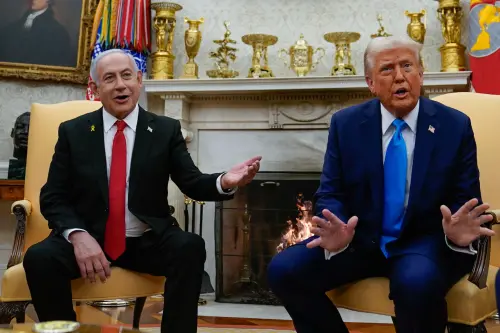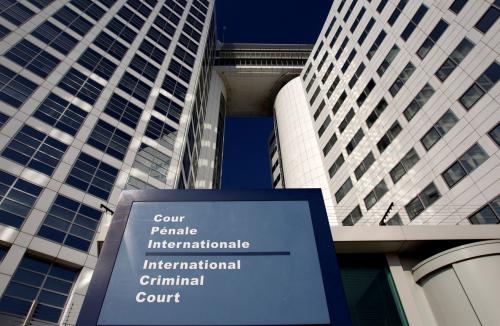After three national elections, a worldwide pandemic, months of a government operating with no new budget, a prime minister indicted in three criminal cases, and a genuine constitutional crisis between the parliament and the supreme court, Israel has landed bruised and damaged where it could have been a year ago.
This week, Israeli opposition leader Benny Gantz opted to break with half of his party and move toward joining caretaker Prime Minister Benjamin Netanyahu in a new government. It was a shock to everyone, and a surprise to no one. The move represented a dramatic departure from where Gantz seemed to be before the last elections, on the cusp of leading a new coalition and ending the Netanyahu era. Yet the outcome is also one Gantz would have taken gladly before he entered politics eons ago in December 2018.
Gantz and Netanyahu tentatively agreed to rotate as prime minister, with Netanyahu serving for 18 months, then Gantz serving 18 months. In the interim, Gantz would be foreign minister and deputy prime minister. This is modeled on Israel’s classic national unity government of 1984-88, where, too, the prime minister’s post rotated between Shimon Peres and Yitzhak Shamir, with the other serving as foreign minister in the interim. The agreement hasn’t been finalized, and it may never be implemented, but already it has torn apart Gantz’s opposition party.
Meanwhile, the relations between the judiciary and the legislature and the basic norms of government have suffered considerably. And the taboo that Gantz’s Blue and White alliance had tried to establish on a prime minister serving while on trial for corruption has been shattered. Netanyahu will stand trial as a re-elected prime minister, not a thrice-caretaker one.
Why did Gantz do it?
This move wounded some of Gantz’s supporters, would-be parliamentary allies, including from among Israeli Arabs, and disappointed many who yearned for Netanyahu’s departure. The results of the September elections — when Gantz himself came close to victory — and the recent elections earlier this month — after which he was not far from forming a minority government — make this move especially dizzying for his voters. Moreover, Gantz had promised not to serve in a government headed by a man on trial for corruption. (Netanyahu’s trial will start when Israeli courts resume operation; his interim justice minister paused them due to — or under the pretext of — the unfolding COVID-19 pandemic.)
Gantz had managed to unite an opposition that lacked leadership for years and seemed to offer a viable political substitute to Netanyahu, who has dominated Israeli affairs for over a decade. So why did Gantz do it? The answer is likely twofold: He saw no better alternative; and he likely hated this option far less than did many of his supporters.
The three elections since April 2019 had produced no new coalition. The latest, in early March, initially seemed to deliver a Netanyahu victory, but he fell just short of the majority of members of Knesset (MKs) he would need to form a government. Israel seemed stuck again, and a fourth round of elections loomed.
In the aftermath of the last election, a few things changed, however. First, the small majority of the MKs that oppose Netanyahu seemed willing, for once, to operate as a unified bloc. The right-wing but anti-Netanyahu Avigdor Lieberman coordinated with Benny Gantz, leader of the center-left Blue and White, recommending him as prime minister. Together, they appeared to be using their anti-Netanyahu Knesset majority as leverage against Netanyahu, perhaps angling for a national unity government on their own terms.
They played two cards. First, they threatened to amend the Basic Law, barring “anyone” on criminal trial from forming a government. Given Netanyahu’s ongoing corruption trial, this change would target the prime minister in all but name.
To do this, the parliamentary majority needed to set the legislative agenda, most importantly by forming an “organizing” committee. The interim speaker of the Knesset, however, was from Netanyahu’s Likud party and, shockingly, refused to let the Knesset operate as normal until coalition negotiations were completed. Even as security surveillance of citizens was implemented in order to track COVID-19 cases, without a functioning Knesset, parliamentary oversight was impossible. The interim speaker even refused to hold a vote on his own permanent replacement, knowing it was slated to be a member of Yair Lapid’s faction within Blue and White. Blue and White appealed to the Supreme Court, which ordered a vote — a move the right wing saw as extreme judicial overreach into the purview of the legislature. In a historic precedent, the speaker refused to obey the court order and resigned.
Second, the majority threatened to act … like a majority. Gantz spoke openly about seeking temporary backing from the predominantly Arab Joint List to form a governing coalition: They would initially support, but not join, the government. Netanyahu had campaigned with a warning that Gantz would do just that, and Blue and White had denied it strenuously. Now Gantz and Lieberman appeared willing to do whatever it took — including breaking campaign promises — to actually win, something about which Netanyahu could teach them a thing or two.
These two moves were not without their drawbacks, ethical and political, respectively. Personal legislation is a dangerous thing and amending a Basic Law to target Netanyahu would be constitutionally suspect at best, made slightly better by Gantz’s intent for it to apply to the next Knesset, not the present one. Meanwhile, two members of Blue and White balked at enlisting the Joint List’s support — even though Bogie Ya’alon, their faction leader, approved of it. Their defections, combined with that of the Labor-aligned Orly Levy-Abekasis, meant that there would be no unified anti-Netanyahu majority for a governing coalition after all.
With no alternative coalition, Gantz was left with hoping for defectors from the right wing, or for the Likud to break rank with Netanyahu. They would not. Netanyahu had proven his strength in the Likud when he defeated his only challenger, Gideon Sa’ar, and when he delivered relative success, if not outright victory, in the last elections.
Gantz could have continued to promote the anti-Netanyahu legislation, but a fourth election might have led to that legislation’s reversal. That, Gantz believed, was the real alternative he faced to a unity government: yet another national election. And in a fourth election, he feared — probably correctly — that he might lose badly. His attempt to rely on the Joint List was deeply unpopular in the Israeli center-right, where Gantz needs votes to beat Netanyahu, and it vindicated Netanyahu’s main “accusation” against Blue and White. Moreover, as Israel deals with the COVID-19 pandemic, people will likely rally around the sitting leader, as is generally the case in such crisis situations. A fourth election would have been a very risky move, as internal polls apparently showed.
Gantz, then, continued to negotiate a national unity deal with Netanyahu. To appease Bibi’s fear of an opposition speaker of the Knesset, Gantz shocked his partner Lapid, submitting himself as a candidate, and winning it easily with the support of his own mini-faction and the right wing he had campaigned against. If he joins the government, he will be replaced by another coalition speaker, rather than the opposition faction of Lapid. In response, Lapid and Moshe Ya’alon split from Gantz, taking the name “Blue and White” with them and forming a new, odd couple at the core of Israel’s opposition. The fourth member of the Blue and White “cockpit,” Gabi Ashkenazi, remained with Gantz.
Gantz’s deal
It was not just that the alternative seemed bad to Gantz, however. The deal he seems to be getting appeals to him. Gantz leads a mostly center-left bloc, but is not a man of the left. He did not enter politics originally with a vehemently anti-Netanyahu stance, and he reportedly considered joining forces with Netanyahu before entering. Gantz is truly a centrist in Israeli terms, and a man of common ground, not cutthroat ambition. That can be an asset in some settings, just as it can be a fault in politics.
Given his alternatives, a promise of rotation with Netanyahu seemed to him to be his best shot to become prime minister. His ally Ashkenazi will likely get the post of defense minister. Crucially, a Gantz supporter will reportedly also become justice minister, allowing Gantz and his supporters to block most options for Netanyahu to escape his trial ordeal so long as this government lasts.
But the agreement, if consummated, would be at once generous for Gantz and a raw deal. In theory, Gantz might get up to half of the portfolios, despite entering the coalition with a splinter faction of only 15 members, compared to Likud’s 36. This would create parity in the cabinet, where decisions depend on votes, based on the parity model of 1984. And Gantz would, in theory, end up as prime minister at the end of the Netanyahu era.
Gantz, however, relinquished his biggest asset and his biggest success to date: the creation and strength of the unified Blue and White. In 18 months he would still only have 15 backers with whom to try and enforce the rotation agreement.. In 1984, by contrast, the two main parties were nearly equal in size. Netanyahu has agreed, it appears, to institute the rotation agreement in legislation, but legislation can be changed, and by then there could be another pandemic, another war, or both.
The Israeli Knesset after Blue and White’s splintering

Even if Gantz gets this deal, its implementation worsens his bargaining position even further. As a rule, Israeli politics operate in modified dog-years: 18 months are equivalent to 18 years. At their end, when Gantz is set to become prime minister, he will be at the political mercy of Netanyahu and the Likud. Even now, before the deal has been signed, Gantz finds himself at Netanyahu’s mercy. If Netanyahu were to pull back, Gantz has no party or bloc to rely on, and Netanyahu has no unified opposition and faces no established electoral challenger if new elections were called.
Prediction is for fools, but it’s hard to find many in Israel today who believe Gantz will be prime minister in 18 months. Perhaps they’re wrong — Gantz has shown remarkably good luck throughout his career — and perhaps Netanyahu will want to exit the scene on his own terms, cutting a plea bargain in his criminal trial but resigning out of political choice rather than legal necessity. Or, perhaps, Gantz’s fate will be like that of numerous opposition leaders before him, some of them generals, who trusted Netanyahu on the promise of national unity, only to see themselves left with no independent political base and no prime ministerial promise.
What this means for policy
This long electoral year has not been free of cost. The three exhausting and ugly election campaigns have pitted Israelis against one another — Jews and Arabs, secular and religious, Ashkenazi and Mizrahi Jews, Bibi supporters and opponents. A deep cynicism toward campaign promises has been strengthened by this latest move, and a sense of revulsion with politics may permeate. This is a dangerous condition, especially in times of national crisis, when a functioning democratic process is essential.
Two major policy decisions stand out. First, on national security: Israel may well annex parts of the West Bank. There is likely a majority in the Knesset for some measure of annexation — including Lieberman’s party and parts of Blue and White. It’s not clear that Gantz or Ashkenazi would oppose such moves strongly enough to prevent them. They may give Netanyahu cover to avoid such moves if he wanted it, but he may want to capitalize on the Trump administration’s license before a possible change of U.S. administration. And yet, Gantz and Ashkenazi could stop many of these developments if they were in government. Will they? It might depend on the messages they hear, as foreign and defense ministers, respectively, from the Trump administration, from Congress, and from potential future administrations.
Second, the crisis over the authority of the supreme court will be an important issue for any new government to deal with. The foundations of Israel’s constitutional make-up are now in play, as this issue takes center stage. Gantz could, if he does join the government and have veto over such issues, via a justice minister, act as a welcome brake on the most potentially dangerous constitutional moves. Such reforms of the judiciary, and a clarification of its powers and their limits, would in the abstract be a welcome development. If pursued today, however, the reforms would arrive in the context of a major political campaign against the very foundations of constitutional checks and balances. Moreover, they would be led by a prime minister whose main campaign line has been that he is being persecuted by an unelected judiciary.
The Brookings Institution is committed to quality, independence, and impact.
We are supported by a diverse array of funders. In line with our values and policies, each Brookings publication represents the sole views of its author(s).







Commentary
In Israel, Benny Gantz decides to join with rival Netanyahu
March 27, 2020